So back around the start of Winter, my brakes started to pulse and possibly grind. I'm a low milage driver and its a long story but I didn't buy coated rotors, so the pads and rotors are the same age and are about 5 years old. I think it was around 2018 or 2019, before the pandemic.
Also, not working in my favor, is that I don't drive every day. Especially in the Summer, I regularly can go 2-3 days without driving.
So today I was changing my oil and rotating my tires. So with all the wheels off, I took a good look at the brakes. And I'm not really sure what to make of it.
There's a lot of rust, as expected. And some pitting on the rotor brake surface. But it doesn't look THAT bad.
As I'm saving the pictures to upload them to this thread, I'm noticing the rear rotors are warn in a few mm. That, plus the severely worn rear pads, plus the BARELY used front pads... do I have a brake bias problem? How would you fix that? Is there an adjustment for it?
It seems like that would explain the grinding. Would that also explain the pulsing? Or is that separate, and just due to rotor age?
Looking at ll the pictures, I'm not sure if I need, pads, rotors, both, or JUST rear pads and rotors but NOT front pads and rotors?
Thoughts?
Here are four pics of the rotors (not 1 pic per rotor, just 4 random pics):
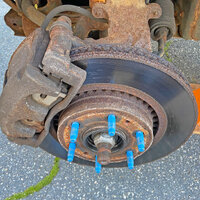
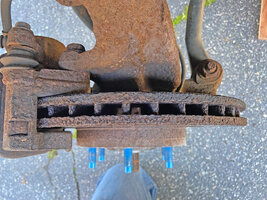
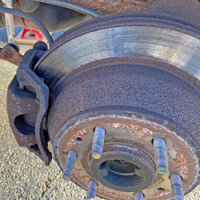
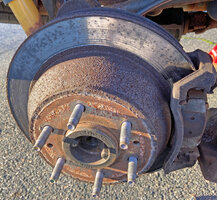
Here's what's left of the rear pads:
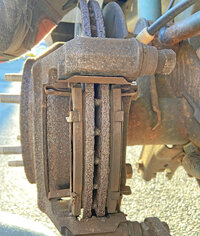
And yet, here is what's left of the front pads:
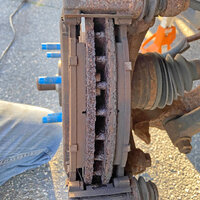
I'm afraid this forum is going to eat my photos again, so here's the same 6 photos hosted externally, just in case:
https://pasteboard.co/pfSe1AnZIFqg.jpg
https://pasteboard.co/cK1TemOqufRc.jpg
https://pasteboard.co/nDKx24iHXqsA.jpg
https://pasteboard.co/g8KfV75lyOuB.jpg
And the pads, rear followed by front:
https://pasteboard.co/7Ikt3KcDQpbf.jpg
https://pasteboard.co/OFhpPNdo3PXx.jpg
Also, not working in my favor, is that I don't drive every day. Especially in the Summer, I regularly can go 2-3 days without driving.
So today I was changing my oil and rotating my tires. So with all the wheels off, I took a good look at the brakes. And I'm not really sure what to make of it.
There's a lot of rust, as expected. And some pitting on the rotor brake surface. But it doesn't look THAT bad.
As I'm saving the pictures to upload them to this thread, I'm noticing the rear rotors are warn in a few mm. That, plus the severely worn rear pads, plus the BARELY used front pads... do I have a brake bias problem? How would you fix that? Is there an adjustment for it?
It seems like that would explain the grinding. Would that also explain the pulsing? Or is that separate, and just due to rotor age?
Looking at ll the pictures, I'm not sure if I need, pads, rotors, both, or JUST rear pads and rotors but NOT front pads and rotors?
Thoughts?
Here are four pics of the rotors (not 1 pic per rotor, just 4 random pics):




Here's what's left of the rear pads:

And yet, here is what's left of the front pads:

I'm afraid this forum is going to eat my photos again, so here's the same 6 photos hosted externally, just in case:
https://pasteboard.co/pfSe1AnZIFqg.jpg
https://pasteboard.co/cK1TemOqufRc.jpg
https://pasteboard.co/nDKx24iHXqsA.jpg
https://pasteboard.co/g8KfV75lyOuB.jpg
And the pads, rear followed by front:
https://pasteboard.co/7Ikt3KcDQpbf.jpg
https://pasteboard.co/OFhpPNdo3PXx.jpg


 and of course, discs on the back and probably rotors there also as the existing one will probably cause the rears to wear more rapidly when replaced.
and of course, discs on the back and probably rotors there also as the existing one will probably cause the rears to wear more rapidly when replaced.